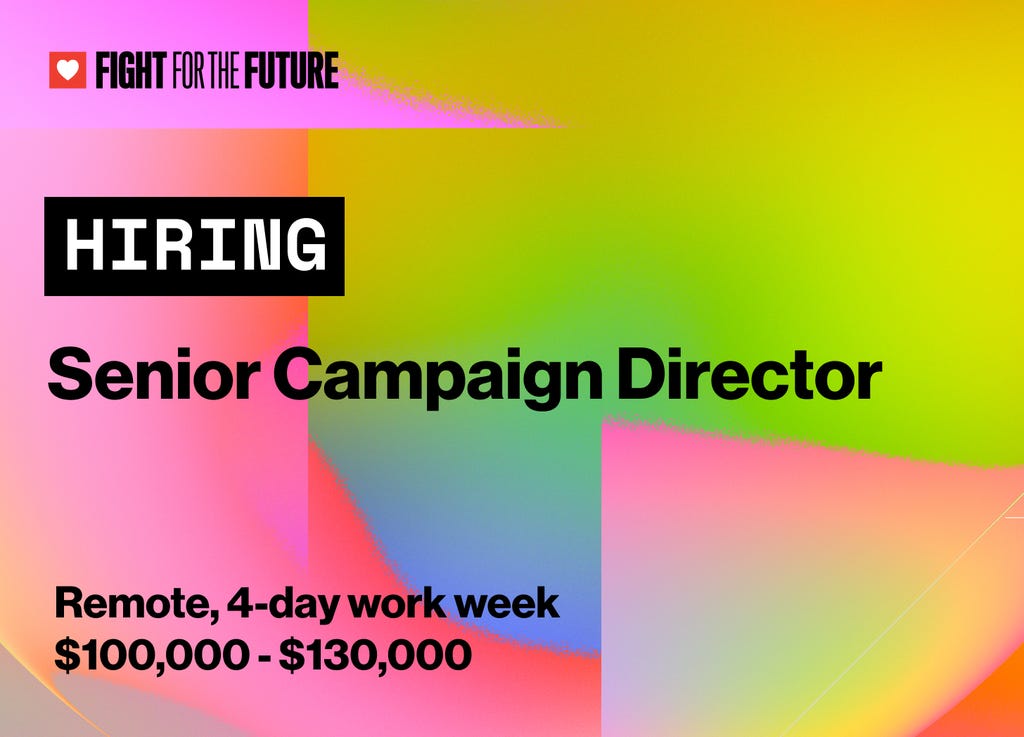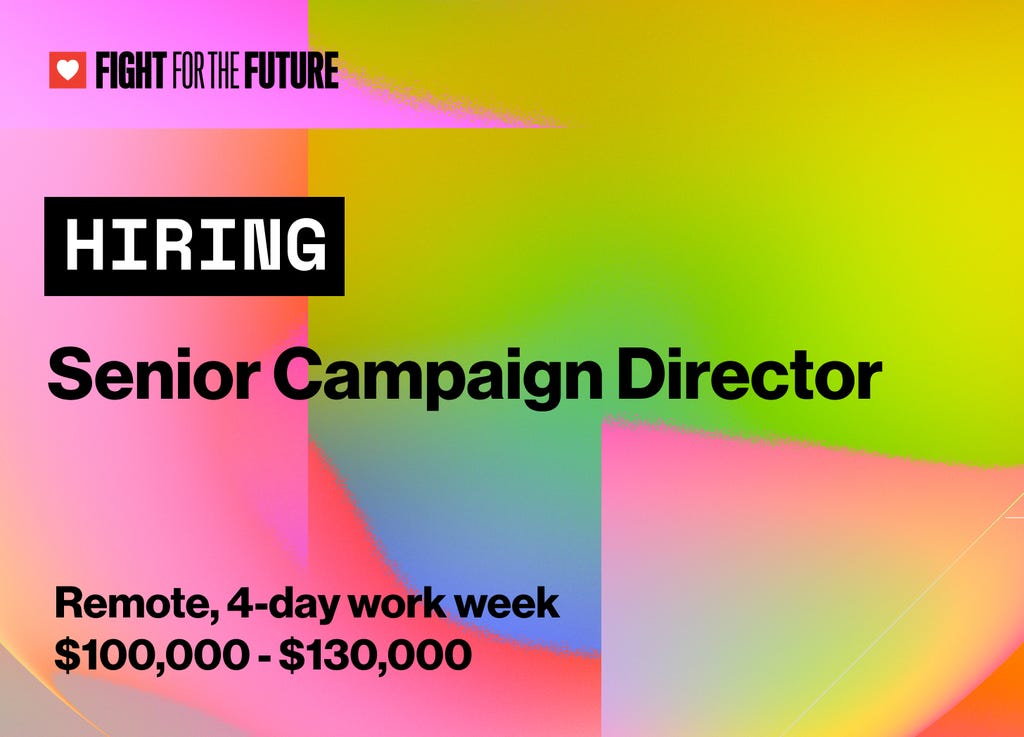Publishers and Musicians in the UK are finally fighting back against Big Tech
Why don’t the same folks in the US do the same?
In recent weeks, publishers in the UK have launched a campaign to push back against Big Tech's unpaid use of their content to train AI systems. It’s the most interesting fight against the power of big tech I’ve seen in some time. I find it interesting because we’re finally seeing powerful industries, such as publishers and musicians, band together to challenge the world's most dominant corporations—Alphabet, Meta, Amazon, etc. It's surprising this hasn’t happened sooner, and I hope publishers everywhere draw inspiration from it and replicate the campaign elsewhere.
AD: Tech policy and activism group Fight For the Future is hiring a senior campaign director. $100-$130k, remote, 4-day work week (Apply HERE before March 17.)
What’s happening in the UK
In response to a UK government call for input on AI policy, a coalition of publishers launched the 'Make It Fair' campaign. The effort united publications across the political spectrum—from the right-wing The Sun to the left-wing The Guardian—in a rare show of solidarity. They coordinated a striking homepage takeover across all major print publications on February 25, demonstrating the power of collective action. They didn’t just use their homepages, they also published editorials and devoted reporting resources to writing about the campaign. Even musicians joined the fight, with over 1,000 artists, including Kate Bush and Damon Albarn, releasing a silent album titled Is This What We Want? The campaign also has backing from the wider creative industry, organizing as part of a group called “Creative Rights in AI Coalition”.
William Randolph Hearst, one of the original publishing magnates, employed the same tactics in the U.S. with his newspapers—yet, for some reason, the U.S. media seems to have forgotten its own history. While it remains to be seen if the UK government will listen to publishers and content creators over the big tech lobbyists, it appears from the outside to be a masterclass in campaigning journalism—one of the few remaining groups with real influence standing up to Big Tech. And remember the stakes couldn’t be higher: Marc Andresson admitted as much: “Imposing the cost of actual or potential copyright liability on the creators of AI models will either kill or significantly hamper their development."
Why have publishers in the US not done the same?
British publishers are clearly comfortable using their platforms for advocacy, whereas many U.S. publishers and reporters remain hesitant—for reasons that don’t quite make sense to me.
Last summer Google managed to kill a bill that would have put a law in place forcing Google to give money to publishers in California. Google managed to convince some publishers that throwing them some scraps would be a better outcome. Google spent over $10m lobbying in ONE QUARTER to kill this bill. Every public affairs firm in Sacramento must have been delighted. They also lobbied small and big publishers as part of a successful effort of dividing the industry.
On the day the deal was announced, I called around to reporters asking if they’d speak at a press conference to denounce reports that Google had managed to kill it. I made over 20 calls. Not one reporter said they were in a position to speak out against what was happening. One editor shared they’d got a call from Google asking if they’d stay quiet about it, and the publisher (a small one who got a grant from Google) decided to do so.
In the end, Google’s outreach was effective: The publishers were not on the same page. They lost because of it.
The stakes are higher than ever. Silicon Valley’s leaders have gone MAGA, and one of the last remaining checks on their power is the dwindling number of publishers and reporters. They should unite and take a stand—such as refusing to allow Google’s web crawler access to their content until they receive fair compensation.
To maximize impact, they should also rally musicians and Hollywood, as we've seen in the UK how powerful these alliances can be. If publishers, musicians, and actors join forces, Big Tech will have little room to maneuver.
Get in touch if you’ve ideas on how to get publishers all on one page and/or to organize across creative industries: william@theworkeragency.com.
What I’m reading:
Nieman Lab published a story about journalists who are getting paid to train AI models. They quoted freelancers saying the pay is more reliable than freelancing. The business model of journalism is broken, and the above blog is one suggestion to fixing it (collective organizing). The same thing is happening with translators in Turkey.
Last week Microsoft workers did a brave thing. They stood up at an internal all hands in front of CEO Satya Nadella and asked: “Does Our Code Kill Kids, Satya? The context here is Microsoft has a big contract with the IDF, who’ve executed a genocide in Palestine. Per a comprehensive AP investigation: “The Israeli military’s usage of Microsoft and OpenAI artificial intelligence spiked last March to nearly 200 times higher than before the week leading up to the Oct. 7 attack, the AP found in reviewing internal company information.”
YC says the thing out loud. When Google and Meta talk about the impact of AI on labor, they frame it as a tool or technology that will make humans better. YCombinator is more honest: “AI agents are going to replace entire teams and functions”.
Writing in the LA Times on Saturday before the Oscars, the Archivers Producers Alliance made the case for history. Yes, a case needs to be made for the importance of verifiable history. Now that AI video generators, like OpenAI’s Sora, can just make up what historic events looked like we really to wake up to the impact of this and take cultural and regulatory steps to change the di
#TeslaTakedown was started by researcher Joan Donovan on Bluesky on a Monday, by Saturday it was on the front page of BBC News. Bluesky works now as a social to earned media distribution network – we haven’t had one of these since Twitter became useless a few years ago.
AD: Tech policy and activism group Fight For the Future is hiring a senior campaign director. $100-$130k, remote, 4-day work week (Apply HERE before March 17.)





